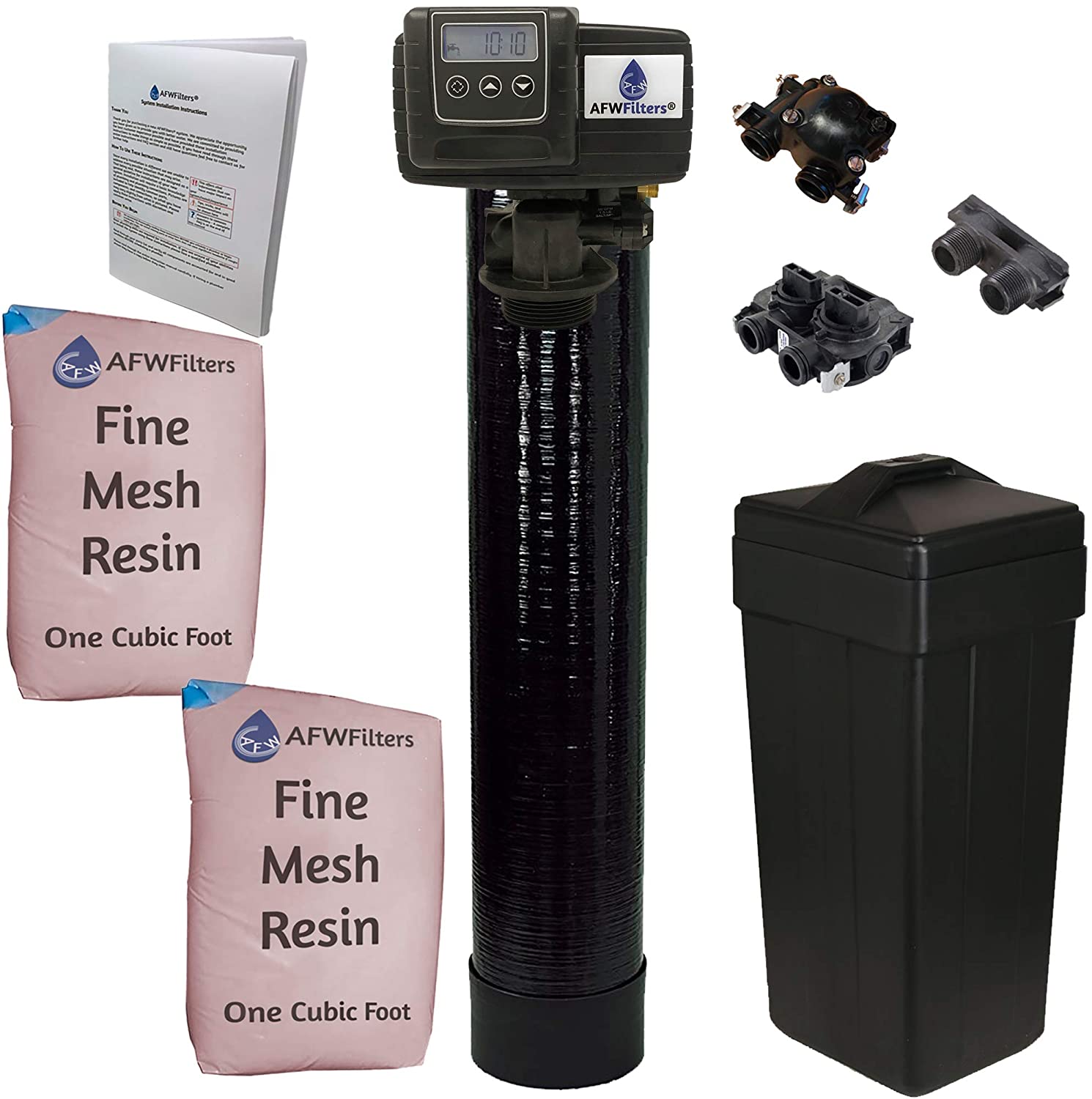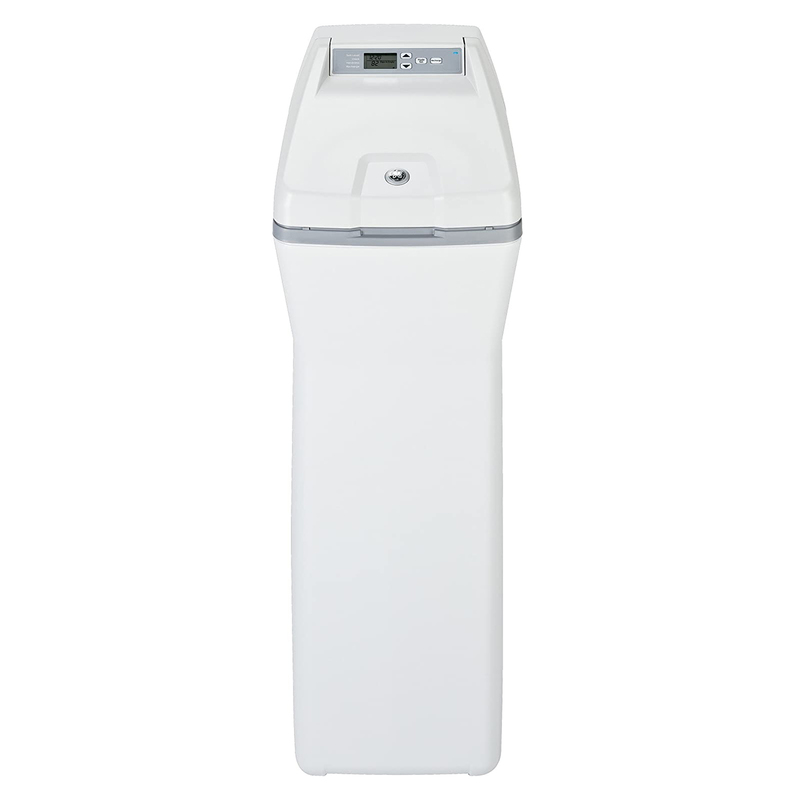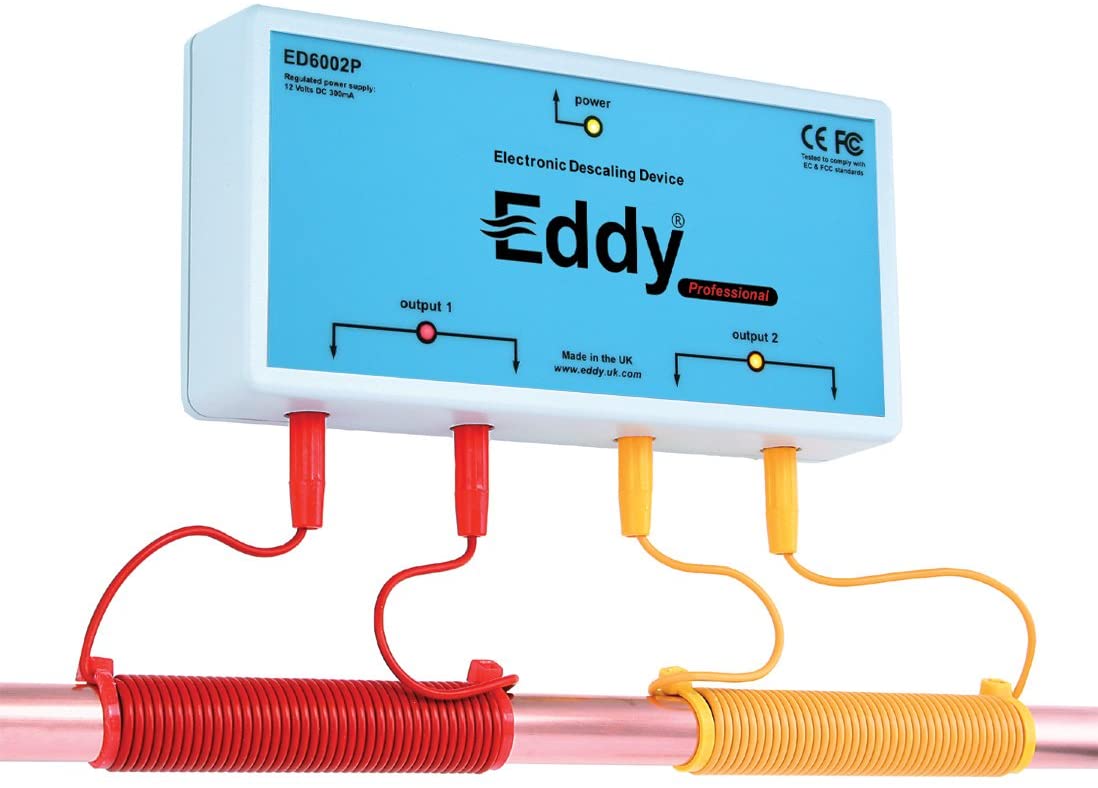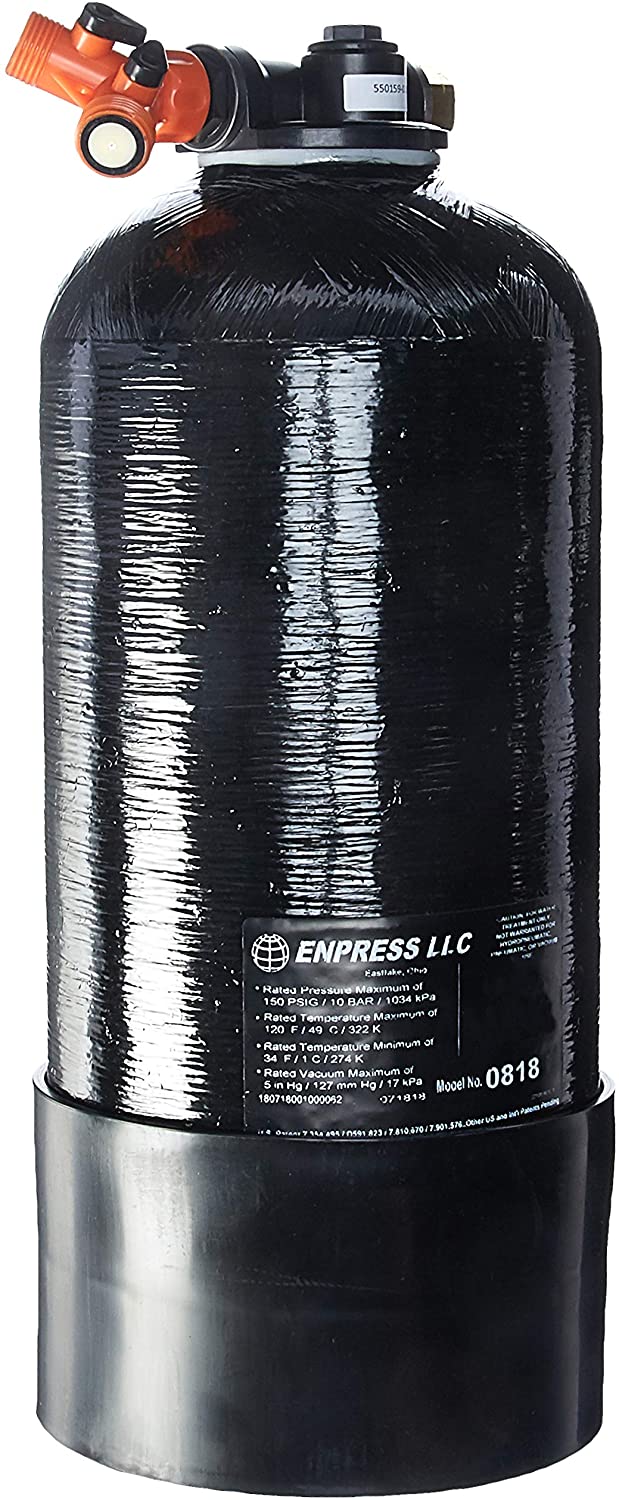The Best Water Softeners for Your Money
If you’ve seen gunky white residue on your sink or shower head, or on glasses when they come out of the dishwasher, there’s a good chance you have hard water.
Hard water — which contains calcium, magnesium and other minerals — is common in almost every state and isn’t actually harmful to your health. The buildup it creates, however, can impact appliances, shortening their lifespan and diminishing their efficiency. It can also eventually slow down the flow of water into the home, clog shower heads and make your clothes fade and deteriorate faster.
Water softener systems counteract this effect by removing minerals from the water, reducing the build-up they tend to leave behind. Softeners can be either liquid or pellets that can be used in specific situations (such as when doing laundry, for example), or they can be whole-house systems that hook directly to your pipes and filter your entire water supply.
This can provide quite a long list of benefits, from a cleaner home and longer-lasting appliances to smoother skin and softer hair.
But beyond the obvious clues, how do you even know if your home has hard water — and calculate just how bad the problem really is?
How To Do a Hard Water Test
In order to find the best water softener for your home, you’ll first need to know just how hard your water is. Water hardness is measured in terms of grains per gallon, with anything above 7 grains per gallon being considered hard or very hard.
You can find out just how many grains of hardness your water has by either calling the county where you live or running your own water test. It doesn't cost much: A good hard water test kit costs around $20.
This information is crucial since it will help you determine how powerful your water-softening system should be — that is, how many grains it will have to remove daily.
For more information on what water softener is right for your needs, read on through our product recommendations to see our comprehensive product buying guide below.
Reviewing the Leading Water Softeners of 2023
1. Best overall: Aquasana Rhino EQ 1000-AST
List Price: $1,818.00
Check on Amazon | Check on Walmart
The Aquasana Rhino EQ-1000-AST is a comprehensive whole-house water treatment system that combines a water filter with a water conditioner. It's ideal for homes with up to 3,500 square feet and 3.5 bathrooms.
It features a five-stage water filtration treatment. Water first goes through a pre-filter that catches rust, silt and sediments. It then passes by a water conditioner that helps prevent hard minerals build-up by crystallizing them. In the third stage, a copper-zinc and mineral stone reduces chlorine, heavy metals, bacteria and algae. Finally, in the last two stages, an activated carbon filter and a post-filter help reduce chemicals like pesticides and herbicides, alongside sediment leftovers and organic particles. As a result, you get filtered, cleaner water for your entire house.
The Aquasana Rhino EQ-1000-AST is protected by a 10-year limited warranty and a 90-day satisfaction guarantee.
Do note that this particular model is not meant for houses with well water. If this is your case, you can consider Aquasana’s Well Water Filter System.
Another drawback is that the system takes up a lot of space due to its size (approximately 4.5 feet in length). It may also require professional installation, especially if you don’t want to affect the warranty which is contingent on proper installation.
Pros
- Five-stage filtration system removes chlorine and modifies hard minerals
- No electricity or salt required
- Little to no water loss when changing filters
- Ideal for increasing water pressure
Cons
- Requires ample space for installation
- Designed for indoor installation only
2. Editor’s pick: AFW Filters Iron Pro 2
List Price: $869.85
Check on Amazon | Check on Sears
The AFW Filters Iron Pro 2 is a powerful salt-based water softener that removes calcium, magnesium, manganese, sediment, rust, sand and ferrous (soluble) iron. It's available with different grain capacities, ranging from 32,000 grains to 80,000 grains. The model we chose has a 64,000-grain capacity, suitable for most households, including those with more than four occupants.
The Iron Pro 2 features a digital LCD metered valve that measures water usage and days left for regeneration and allows adjusting salt usage. It also comes with a 1-inch bypass valve, to control water passage without shutting off the main water supply, and a brine tank for storing salt.
It uses fine mesh resin for softening and removing low levels of iron, up to 6 PPM (parts per million). This means that it can be used for well water. Note that an additional iron filter is recommended if there’s a presence of ferric (insoluble) iron or higher levels of iron.
The unit has an impressive flow rate of 15 gallons per minute (GPM), compared to the typical 7 GPM found in many water softeners. It's also available in three different colors — black, almond and blue.
Take note that the Iron Pro 2 comes with DIY instructions, and some reviewers complain they are confusing and difficult to follow. It also weighs over 90 pounds, which might make it hard to set up on your own.
Pros
- Suitable for removing iron and other impurities
- Easy to install with minimal plumbing tools
- Cost-effective alternative to high-end models
- Programmable digital meter for easy set-up and operation
Cons
- Some reviewers say the instructions are confusing
- Heavy, requiring possible assistance when installing
3. Best for low prices: GE Appliances GXSF30V Water Softener
List Price: $499.00
With a capacity of 30,400 grains per cycle, the General Electric GXSF30V is an affordable midsize salt-based water softener that small households (three to four occupants) with two bathrooms can consider. It removes up to 95 grains of hardness per gallon and 7 PPM of iron, at a service flow rate of 7.5 gallons per minute — enough for softening moderately hard to very hard water in houses with modest water consumption.
The GXSF30V features GE SmartSoft technology, enabling the system to learn household water usage patterns and adjust performance accordingly. It includes programmable operation with permanent memory, allowing it to save your configurations during power outages. It also has a light indicator that notifies you how many days are left before you must refill the tank. One downside, depending on your home's pipes: This model only has a plumbing connection for up to 1-inch pipes.
The softener also comes with three limited warranties: one year for the entire appliance (including labor), 10 years for the resin tank and three years for the electronic monitor.
Pros
- GE’s SmartSoft technology adjusts performance according to usage
- Clear and concise installation instructions
- Programmable for efficient salt consumption
- Compact design for installation in tight spaces
Cons
- Plumbing connections only up to 1-inch pipes
- Increments for setting adjustments could be better
4. Best electronic water descaler: Eddy Electronic Water Descaler
List Price: $199.99
Check on Amazon | Check on Walmart
If you’re experiencing hardness levels below 20 grains per gallon (GPG) and are interested in an alternative water softener to reduce scale build-up, the Eddy Electronic Water Descaler ED6002P should be at the top of your list.
Unlike traditional water softeners, it’s an alternative system that doesn’t remove or add minerals to your water. Rather, it produces an electromagnetic wave that alters the adhesive properties of hard water minerals and prevents them from creating limescale build-up in your pipes. This process is accomplished by wrapping two coils around the incoming water supply line and plugging the Eddy Water Descaler into a power supply.
Because of its convenient compact size (6.75” x 3.5”), it can easily be placed in a wall or panel. This makes it a great option for small apartments and one-bedroom houses. Installation is also very simple and doesn’t require plumbing changes.
There are some drawbacks to consider, however. First, the Eddy will only reduce and delay limescale build-up in your pipes; it won’t eliminate (or soften) heavy minerals from your water. (Consider a traditional salt-based water softener if you have water hardness levels above 20 GPG.) Second, it’s not ideal for homes with lead and iron pipes. It also can’t be placed outside, since it’s not waterproof.
Nonetheless, the company offers a lifetime warranty and a one-year satisfaction guarantee, so if you’re not completely happy with the system you can return it and get your money back.
Pros
- Lifetime repair warranty and 12-month money-back guarantee
- Easy and inexpensive installation
- Non-chemical solution for reducing buildup
- Results in only one to two weeks
Cons
- Can’t be used with lead or iron pipes
- Doesn’t remove existing limescale deposits
5. Best portable water softener: Watts Water Quality Flow-Pur RV-Pro
List Price: $276.39
Check on Amazon | Check on Walmart
If you own an RV or simply enjoy going on camping trips, the Watts RV-Pro M7002 could be the perfect traveling companion.
Despite its compact size (22" x 10"), this water softener has a large capacity of 10,000 grains with a flow rate of up to four gallons per minute. This is more than enough for a typical RV, which usually has a flow rate of one gallon per minute. It works with any kind of salt, including table salt, and takes only about 20 minutes to regenerate.
Overall, the Watts RV-Pro is great for its portability and ease of installation. There are, however, some customer complaints about its Y-valve being made of plastic and prone to breaking, which can sometimes lead to leaks.
Pros
- Compatible with any kind of salt
- Long-lasting performance with minimal maintenance
- Test strips included to monitor hardness
- Heavy-duty brass swivel inlet for hose connections
Cons
- Plastic Y-valve can break easily, leading to leaks
- Significant amounts of salt required for regeneration
6. Best salt-free water softener: SpringWell FutureSoft FS1
With over 20 years of experience, SpringWell is known for manufacturing a variety of water filtration systems, including the FutureSoft salt-free water softener series.
The FS1 model of this series is designed for houses with up to three bathrooms and produces a powerful rate of 12 gallons per minute to ensure adequate water flow. Like most salt-free water softeners, it uses Template Assisted Crystallization (TAC) to alter the structure of hard minerals and prevent them from attaching to surfaces and pipes. SpringWell says FutureSoft can clean existing scale and prevent 99.6% of scale build-up.
SpringWell offers multiple warranties for its products, including a lifetime warranty and a six-month satisfaction guarantee, so if you’re not completely happy with their product they will refund 100% percent of your money, minus a 25% restocking fee.
Pros
- Visibly improves staining on sinks and showers
- Doesn’t require salt or electricity for eco-friendly operation
- Can remove chemical taste from tap water
- Comes with a limited warranty and guarantee
Cons
- Results may vary depending on water hardness
- Installation may require additional plumbing parts
Water Softener Buying Guide
• To find the right water softener system for you, multiply the number of people in your home by how many gallons of water they use daily. (Experts estimate that the average adult uses between 80 and 100 gallons of water a day.) Multiply that by how many grains your water has; you can then look for a system that can handle the number of grains present in your water. According to experts, a four-person household should get a unit that can handle at least 33,000 grains. This size will range in price between $400 and $800.
• Look for a system that’s certified by the National Sanitation Foundation (NSF), an independent, global organization that tests household products and ensures they meet public health standards.
• Make sure your system has a salt monitor, which can alert you when salt is running low and it’s time to replenish.
• Verify if there are regional laws limiting or banning the use of salt-based water softeners in your area or state.
• It’s important to note that salt-based systems leave very low amounts of sodium in the water. If you’re on a strict low-sodium diet, make sure to check with your doctor before buying or choosing a salt-based water softener.
Understanding Water Softeners
Knowing the meaning of these terms can help you when shopping for water softeners:
• Regeneration refers to the process through which water softeners discharge the minerals caught from hard water, and replenish new resin to continue softening water. In large units, this process can take up to 90 minutes. Your water softener should be large enough to withstand about three days without needing regeneration.
• Grain capacity is used by most retailers to describe salt-based water softeners’ capacity. It refers to how many grains of hardness the softener can remove before it needs regeneration.
• Efficiency is usually stated as grains per pound of salt. This is the best way to know how much salt the softener needs to reach its maximum capacity. For example, if a water softener has a grain capacity of 32,000 and an efficiency of 4,800, it means that for every pound of salt, it removes 4,800 grains of water hardness. If we divide 32,000 by 4,800 we then know that this particular water softener requires 6.6 pounds of salt to reach its maximum effectiveness.
• Flow rate, measured by gallons per minute (GPM) is the amount of water that comes out of your faucets in a determined amount of time. In other words, the speed at which water flows through your faucets. An easy way to calculate your flow rate is to fully open your faucet and time how many seconds it takes to fill a gallon container. You then divide 60 seconds by the amount of time it took to fill up. For instance, if it took 16 seconds, divide 60 by 16 — your flow rate is 3.75 GPM.
Water Softener vs. Water Conditioner
One term that often shows up when shopping for water softeners is water conditioners. That’s because both terms refer to water treatment systems used to eliminate or reduce water hardness. There is, however, one major distinction between them, and it has to do with how they accomplish the task.
On one hand, water softeners are salt-based systems that actually remove hard minerals like calcium, magnesium and silica from water through a process called ion exchange. During this process, the softener uses a resin bead, a type of polyester filter that replaces these mineral ions with sodium. As a result, you get water with dissolved sodium but without calcium or magnesium, in other words, softer water.
Water conditioners, on the other hand, manipulate how hard minerals behave by altering their structure through alternative processes that don’t require sodium. The result is that these minerals will still be present in your water, but won’t accumulate on surfaces, appliances or pipes.
There are different types of water conditioners that are usually listed as “water softeners.'' These include what’s typically called salt-free water softeners and electric or magnetic water softeners, also known as descalers.
So which one should you choose?
The answer depends on what results you want to get. If your main concern is scale build-up, both salt-based and salt-free water softeners will prevent hard minerals from sticking to your pipes and appliances. If, however, your intention is to completely eliminate hard water, a salt-based water softener will be best.
There are other unique perks to water softening. For instance, salt-free “water softeners” remove chlorine, biological contaminants like algae and bacteria, and other contaminants that alter water taste and smell. Whereas, some salt-based softeners, especially the ones that use fine mesh resin, can remove low levels of iron without needing an additional filter, a treatment that is usually recommended for water well.
Why Trust Us
Our commitment to the consumer begins with product selection and ends with the last word we write in each article. Each water softener is carefully vetted quantitatively through star ratings and the number of reviews and qualitatively through careful examination of reviews and the features each one has to offer. Leveraging our team of bargain hunters, we’re also always sure to keep your budget in mind while we find the best water softeners on the market. Our team of experts is dedicated to accurately depicting the pros and cons of each water softener, translating technical product specifications into information you can understand. Our goal is to help you choose the ideal water-softening system for your home, so you can protect your plumbing and improve your water quality.
More From Money:
The Best Generators for Your Money
The Best Smart Thermostats for Your Money, According to Heating and Energy Experts






